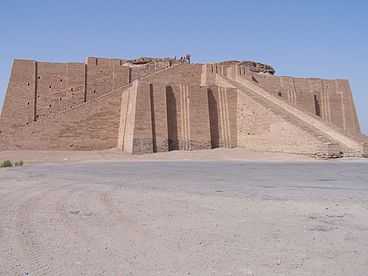Culture of Iraq


Iraq has one of the world's oldest cultural histories. Iraq is where the Ancient Mesopotamian civilizations were, whose legacy went on to influence and shape the civilizations of the Old World. Culturally, Iraq has a very rich heritage. The country is known for its poets and its painters and sculptors are among the best in the Arab world, some of them being world-class. Iraq is known for producing fine handicrafts, including rugs and carpets. The architecture of Iraq is seen in the sprawling metropolis of Baghdad, where the construction is mostly new, with some islands of exquisite old buildings and compounds, and elsewhere in thousands of ancient and modern sites across Iraq.
Unlike many Arab countries, Iraq embraces and celebrates the achievements of its past in pre-Islamic times. What is now Iraq was once the Cradle of Civilization in Ancient Mesopotamia and the culture of Sumer, where writing and the wheel were invented. In the 8th and 9th centuries, the Islamic Abbasid Caliph's presided over what was then one of the world's richest civilizations.

Architecture
Cinema
Literature
Music
Sport
Football is the most popular sport in Iraq. Football is a considerable uniting factor in Iraq, following years of war and unrest. Basketball, swimming, weightlifting, bodybuilding, boxing, kickboxing, and tennis are also popular sports.
The Iraqi Football Association (Arabic: الاتحاد العراقي لكرة القدم) is the governing body of football in Iraq, controlling the Iraq national football team and the Iraq Super League (also known as Dawri Al-Nokba). It was founded in 1948, and has been a member of FIFA since 1950, and the Asian Football Confederation since 1971. The Iraqi national football team were the 2007 AFC Asian Cup Champions after defeating Saudi Arabia in the final.
Cuisine
Iraqi cuisine or Mesopotamian cuisine has a long history going back some 10,000 years – to the Sumerians, Babylonians, Assyrians, and Ancient Persians.[1] Tablets found in ancient ruins in Iraq show recipes prepared in the temples during religious festivals - the first cookbooks in the world.[1] Ancient Iraq, or Mesopotamia, was home to a sophisticated and highly advanced civilization, in all fields of knowledge - including the culinary arts.[1] However, it was in the Islamic Golden Age when Baghdad was the capital of the Abbasid Caliphate that the Iraqi kitchen reached its zenith.[1] Today, the cuisine of Iraq reflects this rich inheritance, as well as strong influences from the culinary traditions of neighbouring Persia, Turkey, and the Syria region.[1]
. Some popular dishes include Kebab (often marinated with garlic, lemon, and spices, then grilled), Gauss (grilled meat sandwich wrap, similar to Döner kebab), Bamieh (lamb, okra, and tomato stew), Quzi (lamb with rice, almonds, raisins, and spices), and salad in pita), Kubbah (minced meat ground with bulghur wheat, or rice and spices), Masgûf (grilled fish with pepper and tamarind), and Maqluba (a rice, lamb, tomato, and aubergine dish). Stuffed vegetable dishes such as Dolma and Mahshi are also popular.[2]
Contemporary Iraq reflects the same natural division as ancient Mesopotamia,[3] which consisted of Assyria in the arid northern uplands and Babylonia in the southern alluvial plain.[3] Al-Jazira (the ancient Assyria) grows wheat and crops requiring winter chill such as apples and stone fruits.[3] Al-Irāq (Iraq proper, the ancient Babylonia) grows rice and barley, citrus fruits, and is responsible for Iraq's position as the world's largest producer of dates.[3]
Modern culture
Cultural heritage
Iraq is a country of a wide and varied heritage, home to Muslims. As such many have contributed to the wide spectrum of Iraqi Culture.
Traditional music consists of instruments such as ouds, flutes, violins, drums, and tambourines. Now however, there are many young artists generating pop, rap, and wider types of musical genres. Kulthum and Fairouz are two woman singers renowned for their voices and especially loved in Iraq.
Tea houses are scattered throughout Iraq, and in the afternoon, it is a habit for shopkeepers to retreat into the back with close friends to sip tea over gossip, an Iraqi "siesta".
Arab rites of passage in Iraq are primarily centered on children being educated to correctly read the Quran. The Quran is a difficult text to read properly for various reasons, among them: the depth of meaning and various uses of a large number of distinct and indistinct words, the various schools of thought concerning tajwid or what exactly makes a "proper" recitation, and the complex sounds Arabic demands from human vocal cords. A child (or any person) who has completely memorized the Quran is called a "hafiz", or "guardian". There is usually a large celebration in the child's honor if he has reached this level of excellence.
Cultural institutions

Some important cultural institutions in the capital include the Iraqi National Orchestra – rehearsals and performances were briefly interrupted during the Occupation of Iraq, but have since returned to normal, the National Theatre of Iraq – the theatre was looted during the 2003 Invasion of Iraq, but efforts are underway to restore the theatre. The live theatre scene received a boost during the 1990s, when UN sanctions limited the import of foreign films. As many as 30 movie theatres were reported to have been converted to live stages, producing a wide range of comedies and dramatic productions.
Institutions offering cultural education in Baghdad include the Academy of Music, Institute of Fine Arts, and the Music and Ballet school Baghdad. Baghdad also features a number of museums including the National Museum of Iraq - which houses the world's largest and finest collection of artifacts and relics of Ancient Iraq civilizations; some of which were stolen during the Iraq War.
See also
References
- ↑ 1.0 1.1 1.2 1.3 1.4 http://www.thingsasian.com/stories-photos/3592 Foods of Iraq: Enshrined With A Long History. Habeeb Salloum.
- ↑ Albala, Ken (2011). Food Cultures of the World Encyclopedia. ABC-CLIO. pp. 251–252. ISBN 9780313376276.
- ↑ 3.0 3.1 3.2 3.3 Davidson, Alan; Jaine, Tom (2006). The Oxford Companion to Food. Oxford University Press. p. 405. ISBN 978-0-19-280681-9.
| ||||||||||||||||||||||||||||||||||||||||||||||||||||||